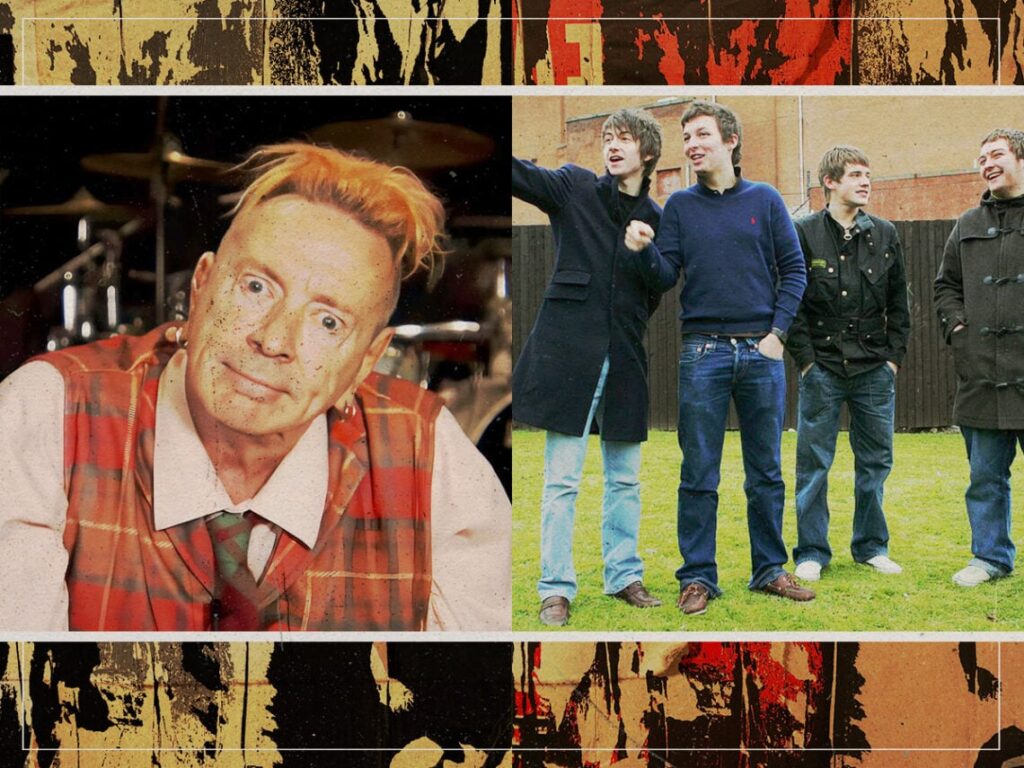Why did John Lydon label the Arctic Monkeys a “mockery”?
 Posted On
Posted On
(Credits: Far Out / YouTube Still / Alamy)
Any band worth listening to has probably been slagged off by John Lydon at some point. The former Sex Pistols frontman, continuing to perform with post-punk progenitors Public Image Ltd, has repeatedly proven himself to have something of an acid tongue when it comes to discussing his fellow musicians. Over the years, everybody from Donna Summer to the Ramones has faced the wrath of Johnny Rotten, but his attack on Alex Turner and Arctic Monkeys still feels fairly outlandish.
For one, there is a clear disparity in both sound and target audience between the music of Lydon and Turner. One is a prolific songwriter who drew upon the inspiration of an early 2000s revival in garage rock and indie to establish himself and his band before diversifying the group’s sound and lyrical content with every subsequent album. The other was thrown into a manufactured punk outfit by a clothes salesman and has been riding high off that reputation for the past five decades.
Arctic Monkeys are a force to be reckoned with when it comes to modern British rock. Their debut album, Whatever People Say I Am, That’s What I’m Not, was the fastest-selling debut album in British musical history upon its release, and the Sheffield group continue to sell out arenas around the world to this day. Nevertheless, Lydon is not convinced. In a 2010 interview with Q, he rallied against Turner and company, asserting, “That’s not a band. That’s a showbiz construct. A mockery.”
Equating a young group, who have released all of their material through an independent record label, Domino, to a manufactured showbiz construct is a pretty contentious claim and one that Lydon probably isn’t qualified to make. After all, the Sex Pistols were formed by Malcolm McLaren based entirely upon what they looked like, and the band existed largely on shock factor, with a distinct lack of musical talent or songwriting proficiency.
Regardless, the ageing punk rocker continued to lament Arctic Monkeys, arguing, “They don’t advance. They’re stuck in a time warp and not writing from the heart,” adding, “Once you recognise the four walls of a genre and stick inside them, you are not writing from the heart.” Admittedly, this interview occurred back in 2010, before Turner had taken the band into a genre much closer to easy-listening jazz or lounge music than adolescent indie rock. However, 2009 had seen the release of Humbug, awash with mature and heartfelt songwriting, signalling a move away from the indie rock of the first two records.
Humbug contains perhaps Turner’s greatest lyrics, but again, the ‘Bodies’ songwriter disagreed. “He just turns on the computer and types in ‘punk’, and it goes ping,” he argued, “I see no gut-wrenching soul-searching going on there. Just pleasant little ditties. There’s room for that, but I’m seeking more substance.” Lydon might be overestimating his own influence here, as Arctic Monkeys never particularly embraced punk rock. Some of their earlier tracks certainly shared elements of punk, but generally, the band were much more influenced by indie and garage rockers like The Strokes than the archaic pseudo-rebellion of the Sex Pistols.
Whether or not John Lydon actually believes half the stuff he says in interviews remains largely unknown. His comments about Turner and Arctic Monkeys give the impression of an old man being angry at the younger generation for doing their own thing without him after he was once a teenage icon and representative of the disenfranchised youth.
[embedded content]

